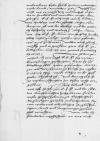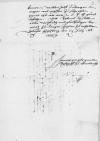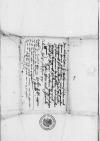Noch E(wer) F(urstlichen) D(urchlauch)t negst bey unserm camerjungen cf. Albrecht I von Hohenzollern-Ansbach to Ioannes DANTISCUS Königsberg, 1539-06-30, CIDTC IDL 4956⌊antwurtcf. Albrecht I von Hohenzollern-Ansbach to Ioannes DANTISCUS Königsberg, 1539-06-30, CIDTC IDL 4956⌋ / hab wir Sigismund I Jagiellon (Zygmunt I) (*1467 – †1548), King of Poland and Grand Duke of Lithuania (1506-1548); Duke of Głogów (Glogau) (1499-1506), Duke of Opava (1501-1506), Governor of Silesia (1504-1506); son of King Kazimierz IV Jagiellon and Elisabeth of Austria⌊ko(nigliche)r m(aieste)tSigismund I Jagiellon (Zygmunt I) (*1467 – †1548), King of Poland and Grand Duke of Lithuania (1506-1548); Duke of Głogów (Glogau) (1499-1506), Duke of Opava (1501-1506), Governor of Silesia (1504-1506); son of King Kazimierz IV Jagiellon and Elisabeth of Austria⌋, u(nseres) a(llergnedigsten) hern, brive entpfangen, / dorynnen zugelassen wirt unsere Provincial Diet of Royal Prussia ⌊thagfhartProvincial Diet of Royal Prussia ⌋ uff s(ancti) Michaelis[1], / wor dy lufft am gesundesten sein wirdt, / zu haltenn, / inn welchem mit gotlicher hulff zu samne komen wolle wir uns neben andern hern E(wer) F(urstlichen) D(urchlauch)t schreyben nach halten etc.
Es sein uns dyse beygelegte czeytungenn(n) von ko(nigliche)m hove jestrigs thags zu komen, / dy der her Samuel Maciejowski (*1499 – †1550), humanist and diplomat, one of the most trusted advisors to King Sigismund I and then to his son Sigismund II Augustus; from 1521 Canon of the Collegiate Chapter in Sandomierz, and from 1530 in Kielce; from 1531 Canon of Gniezno; from 1532 or 1533 to 1537 royal secretary (previously scribe at the royal chancellery); 1537-1539 Grand Secretary; 1539-1547 Crown Vice-Chancellor; 1539-1541 Bishop of Chełm; 1541-1545 Bishop of Płock; 1545-1550 Bishop of Cracow; 1547-1550 Crown Grand Chancellor; in 1532 royal envoy to Rome; in 1534 and 1538 royal envoy to the local diets (WYCZAŃSKI 1990, p. 257-258; Urzędnicy 10, p. 184; PSB 19 Machowski - Maria Kazimiera, p. 64-69)⌊dechent zu Kraka und der Kron un underkanczlerSamuel Maciejowski (*1499 – †1550), humanist and diplomat, one of the most trusted advisors to King Sigismund I and then to his son Sigismund II Augustus; from 1521 Canon of the Collegiate Chapter in Sandomierz, and from 1530 in Kielce; from 1531 Canon of Gniezno; from 1532 or 1533 to 1537 royal secretary (previously scribe at the royal chancellery); 1537-1539 Grand Secretary; 1539-1547 Crown Vice-Chancellor; 1539-1541 Bishop of Chełm; 1541-1545 Bishop of Płock; 1545-1550 Bishop of Cracow; 1547-1550 Crown Grand Chancellor; in 1532 royal envoy to Rome; in 1534 and 1538 royal envoy to the local diets (WYCZAŃSKI 1990, p. 257-258; Urzędnicy 10, p. 184; PSB 19 Machowski - Maria Kazimiera, p. 64-69)⌋ an E(wer) F(urstliche) D(urchlauch)t durch uns zu langen begert etc.
Wir thuen uns auch hochlich gen E(wer) F(urstliche) D(urchlauch)t bedancken / des gancz gunstigenn und freuntlichenn erbieten, / im negsten E(wer) F(urstlicher) D(urchlauch)t schreyben uns anczeygt. / Wollen uns auch der mass gen E(wer) F(urstliche) D(urchlauch)t in allem, / so vyl uns um(m)er muglich, / halthen, / das kein misfallen dorauss erwachssen muge, / dyweyl wir uns vorsehen, / das E(wer) F(urstliche) D(urchlauch)t nichts von uns unleidlichs werde furdren, / sein auch im hoffen, E(wer) F(urstliche) D(urchlauch)t werde nichts begeren, / das unser obrikeyt zu nachteyl ader vordris mochte komen. / Dem vorleugneten pryster aber, / dem wir unser Ermland (Warmia, Varmia), diocese and ecclesiastical principality in northeastern Poland, 1466-1772 within the Kingdom of Poland, Royal Prussia⌊landtErmland (Warmia, Varmia), diocese and ecclesiastical principality in northeastern Poland, 1466-1772 within the Kingdom of Poland, Royal Prussia⌋, / das er aus unser straff, uffrurs  GStA, PK, HBA, C 1, No 578, f. 1v und anderer bosen sthuck halben, / entwichen, / unser landt vorbotten haben, / wysse wir nicht, wy er uns zu trocz und smaheyt sicher dorin handlen und wandlen mochte, / dergleichen E(wer) F(urstliche) D(urchlauch)t auch nicht wurde dulden. / Was thodslege und der gestaltt sachen sein, / dorynne yst mit der oberkeyt und den parten, dy beschedig, umb vortrag zu suchen, / darin wir bey E(wer) F(urstlichen) D(urchlauch)t, / dovor wir hochlich dancken, / etlich mhal gunstige vylfhericheyt gefunden, / wol umb zu komen. / Wollen auch gleichmessig und in grossern gern E(wer) F(urstlichen) D(urchlauch)t gefellig sein, / auch wy wir gewont freuntlich dynen etc. /
GStA, PK, HBA, C 1, No 578, f. 1v und anderer bosen sthuck halben, / entwichen, / unser landt vorbotten haben, / wysse wir nicht, wy er uns zu trocz und smaheyt sicher dorin handlen und wandlen mochte, / dergleichen E(wer) F(urstliche) D(urchlauch)t auch nicht wurde dulden. / Was thodslege und der gestaltt sachen sein, / dorynne yst mit der oberkeyt und den parten, dy beschedig, umb vortrag zu suchen, / darin wir bey E(wer) F(urstlichen) D(urchlauch)t, / dovor wir hochlich dancken, / etlich mhal gunstige vylfhericheyt gefunden, / wol umb zu komen. / Wollen auch gleichmessig und in grossern gern E(wer) F(urstlichen) D(urchlauch)t gefellig sein, / auch wy wir gewont freuntlich dynen etc. /
Wir hetten gemeynt, / do wir negst E(wer) F(urstlichen) D(urchlauch)t bey unserm kamerjungen cf. Ioannes DANTISCUS to Albrecht I von Hohenzollern-Ansbach Heilsberg (Lidzbark Warmiński), 1539-06-22, CIDTC IDL 5215⌊geschrybencf. Ioannes DANTISCUS to Albrecht I von Hohenzollern-Ansbach Heilsberg (Lidzbark Warmiński), 1539-06-22, CIDTC IDL 5215⌋, / das er Königsberg Town Council ⌊dy zu KunsbergKönigsberg Town Council ⌋ sold haben gefunden, / derwegen wir vor seynner zukunfft im negsten s(anct) Johans thag[2] / unser bothen an ko(nigliche)n hoff haben abgeferttigt, / und dennoch E(wer) F(urstliche) D(urchlauch)t yn unserm schreyben im besten nicht vorgessen etc.
Auch bedanck wir uns uffs hochste gen E(wer) F(urstliche) D(urchlauch)t und der selbten durchlauchten hochgebornen Dorothea von Oldenburg (*1504 – †1547), Duchess in Prussia (1526-1547); first wife of Albrecht I von Hohenzollern-Ansbach, Duke in Prussia, daughter of Frederic I von Gottorp, King of Denmark, and Anna von Hohenzollern⌊furstinDorothea von Oldenburg (*1504 – †1547), Duchess in Prussia (1526-1547); first wife of Albrecht I von Hohenzollern-Ansbach, Duke in Prussia, daughter of Frederic I von Gottorp, King of Denmark, and Anna von Hohenzollern⌋, unser hochgelypten in Got beychttochter(r), / des gunstigen grusses und entpietens, / der wir widerumb alle selicheit in gluckseligem stande und langweriger gesuntheyt wunschen. /
Was aber dy flinderlein anghet, / dy sein an uns nicht  GStA, PK, HBA, C 1, No 578, f. 2r komen. / Wollen Iustus Ludovicus Decius (Justus Ludwik Decjusz, Jost Ludwig Dietz, Iodocus Decius) (*ca. 1485 – †1545), merchant, historian, reformer of the Polish monetary system; ennobled in 1519; 1520-1524 royal secretary; 1528 Cracow town councillor; 1528 alderman in Piotrków; 1526-1535 administrator of the royal mint in Königsberg; 1528-1535 administrator of the royal mint in Thorn; 1530-1540 administrator of the royal mint in Cracow; 1519, 1520, 1522, 1523-1524 - royal envoy to Italy (PSB 5, p. 42-45; WYCZAŃSKI 1990, p. 250-251; NOGA, p. 304)⌊Jobst LudwigenIustus Ludovicus Decius (Justus Ludwik Decjusz, Jost Ludwig Dietz, Iodocus Decius) (*ca. 1485 – †1545), merchant, historian, reformer of the Polish monetary system; ennobled in 1519; 1520-1524 royal secretary; 1528 Cracow town councillor; 1528 alderman in Piotrków; 1526-1535 administrator of the royal mint in Königsberg; 1528-1535 administrator of the royal mint in Thorn; 1530-1540 administrator of the royal mint in Cracow; 1519, 1520, 1522, 1523-1524 - royal envoy to Italy (PSB 5, p. 42-45; WYCZAŃSKI 1990, p. 250-251; NOGA, p. 304)⌋ derwegen wol wyssen zu cf. [Ioannes DANTISCUS] to [Iustus Lodvicus DECIUS (DECJUSZ, DIETZ)] Heilsberg (Lidzbark Warmiński), 1539-07-[16 or shortly after], CIDTC IDL 3868⌊schreybencf. [Ioannes DANTISCUS] to [Iustus Lodvicus DECIUS (DECJUSZ, DIETZ)] Heilsberg (Lidzbark Warmiński), 1539-07-[16 or shortly after], CIDTC IDL 3868⌋. / Hymit thu wir uns in E(wer) F(urstlichen) D(urchlauch)t gunst befelhen / Gott byttend, dy selbte in aller wolfarth und gluckseligen regiment zu langen zeytten zu erhalten. /
GStA, PK, HBA, C 1, No 578, f. 2r komen. / Wollen Iustus Ludovicus Decius (Justus Ludwik Decjusz, Jost Ludwig Dietz, Iodocus Decius) (*ca. 1485 – †1545), merchant, historian, reformer of the Polish monetary system; ennobled in 1519; 1520-1524 royal secretary; 1528 Cracow town councillor; 1528 alderman in Piotrków; 1526-1535 administrator of the royal mint in Königsberg; 1528-1535 administrator of the royal mint in Thorn; 1530-1540 administrator of the royal mint in Cracow; 1519, 1520, 1522, 1523-1524 - royal envoy to Italy (PSB 5, p. 42-45; WYCZAŃSKI 1990, p. 250-251; NOGA, p. 304)⌊Jobst LudwigenIustus Ludovicus Decius (Justus Ludwik Decjusz, Jost Ludwig Dietz, Iodocus Decius) (*ca. 1485 – †1545), merchant, historian, reformer of the Polish monetary system; ennobled in 1519; 1520-1524 royal secretary; 1528 Cracow town councillor; 1528 alderman in Piotrków; 1526-1535 administrator of the royal mint in Königsberg; 1528-1535 administrator of the royal mint in Thorn; 1530-1540 administrator of the royal mint in Cracow; 1519, 1520, 1522, 1523-1524 - royal envoy to Italy (PSB 5, p. 42-45; WYCZAŃSKI 1990, p. 250-251; NOGA, p. 304)⌋ derwegen wol wyssen zu cf. [Ioannes DANTISCUS] to [Iustus Lodvicus DECIUS (DECJUSZ, DIETZ)] Heilsberg (Lidzbark Warmiński), 1539-07-[16 or shortly after], CIDTC IDL 3868⌊schreybencf. [Ioannes DANTISCUS] to [Iustus Lodvicus DECIUS (DECJUSZ, DIETZ)] Heilsberg (Lidzbark Warmiński), 1539-07-[16 or shortly after], CIDTC IDL 3868⌋. / Hymit thu wir uns in E(wer) F(urstlichen) D(urchlauch)t gunst befelhen / Gott byttend, dy selbte in aller wolfarth und gluckseligen regiment zu langen zeytten zu erhalten. /
 GStA, PK, HBA, C 1, No 578, f. 2v
GStA, PK, HBA, C 1, No 578, f. 2v  GStA, PK, HBA, C 1, No 578, f. 1r
GStA, PK, HBA, C 1, No 578, f. 1r  GStA, PK, HBA, C 1, No 578, f. 1v und anderer bosen sthuck halben, / entwichen, / unser landt vorbotten haben, / wysse wir nicht, wy er uns zu trocz und smaheyt sicher dorin handlen und wandlen mochte, / dergleichen E(wer) F(urstliche) D(urchlauch)t auch nicht wurde dulden. / Was thodslege und der gestaltt sachen sein, / dorynne yst mit der oberkeyt und den parten, dy beschedig, umb vortrag zu suchen, / darin wir bey E(wer) F(urstlichen) D(urchlauch)t, / dovor wir hochlich dancken, / etlich mhal gunstige vylfhericheyt gefunden, / wol umb zu komen. / Wollen auch gleichmessig und in grossern gern E(wer) F(urstlichen) D(urchlauch)t gefellig sein, / auch wy wir gewont freuntlich dynen etc. /
GStA, PK, HBA, C 1, No 578, f. 1v und anderer bosen sthuck halben, / entwichen, / unser landt vorbotten haben, / wysse wir nicht, wy er uns zu trocz und smaheyt sicher dorin handlen und wandlen mochte, / dergleichen E(wer) F(urstliche) D(urchlauch)t auch nicht wurde dulden. / Was thodslege und der gestaltt sachen sein, / dorynne yst mit der oberkeyt und den parten, dy beschedig, umb vortrag zu suchen, / darin wir bey E(wer) F(urstlichen) D(urchlauch)t, / dovor wir hochlich dancken, / etlich mhal gunstige vylfhericheyt gefunden, / wol umb zu komen. / Wollen auch gleichmessig und in grossern gern E(wer) F(urstlichen) D(urchlauch)t gefellig sein, / auch wy wir gewont freuntlich dynen etc. /
 GStA, PK, HBA, C 1, No 578, f. 2r komen. / Wollen
GStA, PK, HBA, C 1, No 578, f. 2r komen. / Wollen 


